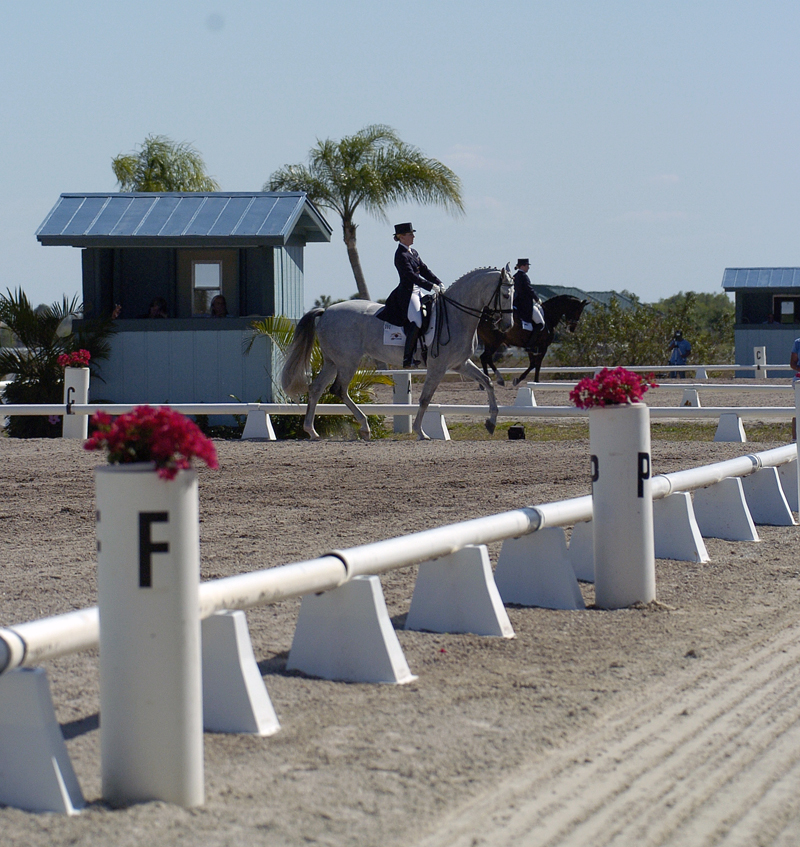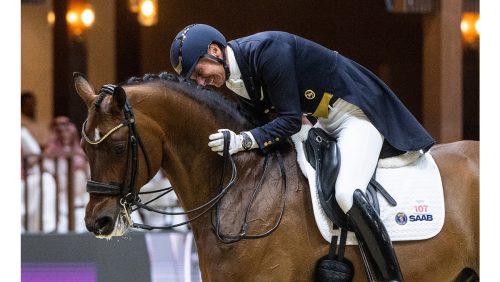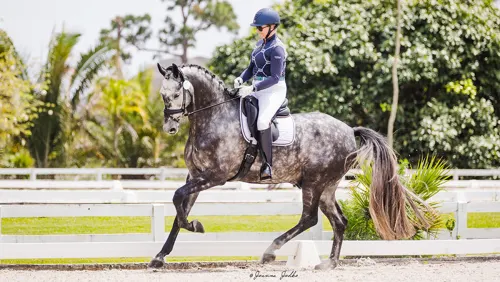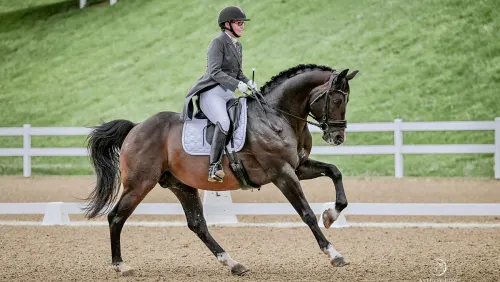Natural talent is a good start, but you won’t achieve greatness without a passion for training.
How often have you heard someone say, “She is so talented,” or, “He is so talented,” about a horse or rider? These days when I am closely following the progress of our elite and upcoming athletes, I hear this a lot.
Although I may fully agree, there is a little voice in the back of my head that says, “So what?” That is because I know from many years of teaching riders and training horses that talent is wasted without commitment, discipline and practice. I’ve had some extreme talents come my way, but far from all of them achieved great things because they lacked the passion and energy to put in the necessary effort to hone their gift.
Geoff Colvin has written a book called Talent Is Overrated, and he provides a lot of very interesting information regarding assumptions we have about pure talent propelling people through life and earning them rich rewards. Many of the statements he makes are things that anyone who has spent time promoting and trying to improve a specific talent will agree with. Even if I didn’t have proof that achieving above-average success in anything takes more than talent, I knew it from working with riders and horses over the years. When reading this book, my suspicions were confirmed.
Top riders are, as all competitors, driven by an almost blinding passion for that with which they are involved. Although riding is not specifically mentioned in the book, a number of other sports, professions and arts are. The addition of another athlete—the horse—to some degree changes the picture, but the basic premise of the book covers any activity in which humans strive for perfection.
Starting with the passion for horses and riding, which is the reason almost every person gets involved with our sport, how far can it take us if we do not posses a greet degree of natural talent? According to Mr. Colvin, as far as you want to go if you have the motivation and opportunity to devote to perfect practice.
Passion is a tremendous driving force. What else could motivate us to get back on a horse after a bad fall, tackle that youngster full of vim and vigor, or compete in front of an audience—all situations that can be considered beyond our comfort zone?
What else can get us out in the driving rain at 6 a.m. on Sunday to warm up for an early class, drive hours to and from the show, and pay for it to boot?
A fire in your belly to succeed is enormously important, but there are great geniuses who actually didn’t start out with a burning desire to excel. Instead, they had someone else at their side, often a parent who, at an early age, motivated, pushed, encouraged and sometimes threatened his or her progeny into a program of practice that became the path to performance.
ADVERTISEMENT
Nothing Comes For Free
Colvin repeatedly brings up real life stories of people universally recognized as natural talents, and he proves that they did not, in fact, get anything for free. He mentions examples such as Mozart, whose father, an accomplished musician, had his son playing the piano at age 3; Tiger Woods, who was swinging a golf club when he was 4; and Picasso, who worked tirelessly studying primitive and traditional art for a decade before “suddenly” appearing with his revolutionary paintings.
According to the author, there are two kinds of drive that make up our motivation: the extrinsic drive that is externally induced or driven and the intrinsic drive that stems from strong emotions creating the desire to perform. The latter is what helps us overcome the pain and humiliation of falling off, to get back on and practice some more. That is the kind of passion that makes us so totally involved in a task that time disappears and the work seems effortless.
So, passion is the driving force, but great motivation and talent are still not going to get you anywhere without practice, practice, practice. Colvin drives home this fact in one case history after another. From chess player Bobby Fischer to the Beatles, they practiced their craft over and over again for years and with high repetition.

Top U.S. riders are at a disadvantage to their European counterparts because they lack the opportunity to regularly practice in the show ring against competitors of the same caliber. Photo by Sara Lieser
Anyone who has audited a clinic given by Kyra Kyrklund will remember how she repeatedly says that you have to practice things literally millions of times to develop “muscle memory,” which works like an automatic transmission between horse and rider without the rider having to engage the brain to shift gears. Really good riders do not “think” about what they are doing; they do it because it’s become second nature to them.
We Need To Practice At Shows
This phenomenon becomes really evident when you closely observe our top competitive riders and the very best riders in Europe. What is the biggest difference between our finest and theirs? Lack of talent? No. Lack of horses with talent? No, but in the United States we don’t have enough of them per rider.
Lack of opportunity? Yes, when it comes to shows available within a reasonable distance and taking place all year long. The cream of dressage riders in Europe can compete in a creditable event every weekend of the year if they choose, and most of them actually show on average every second or at least third week year round. They each have three to five Grand Prix horses to rotate and several small tour horses that go along.
Take a moment and consider how many times those Europeans get in the ring to compete over a year! When they get to championships, it’s just another horse show to them, while to us it is an enormous event!
ADVERTISEMENT
The lack of routine in actually riding the tests puts our U.S. riders at a disadvantage in international competition.
The intense activity on the Florida circuit is a fabulous opportunity and the only time our riders have the advantage of living close to each other and physically sharing their experience.
But it is a four-month stint at best, and then everybody disperses to their home base, and the distances loom large once again. The vast separation between our riders and shows is one of our greatest stumbling blocks, but we bravely face the challenge by routinely driving and flying our horses across the United States and the world to get where we need to be.
Australia, Canada and South America share our dilemma, and it sure slows down the progress and sometimes brings it to a halt.
Since practice is the issue here, and instant genius appears to be a misconception, this is a problem we’re constantly trying to work on. It’s hard to achieve perfect practice without the tools available.
Luckily, this country abounds in energy, optimism and inventiveness.
Adversity has never hindered Americans from testing their ability and measuring their skills against others, and we do love to compete. I know we have the pool of talent we need, the will to work and the ambition to win. All we need is more endless, perfect practice.
Anne Gribbons is the U.S. Equestrian Federation Technical Advisor for dressage. She has trained and shown 15 horses of her own to Grand Prix and competed in 10 national championships as well as in Europe, including the Aachen CHIO (Germany). Seven of her horses have been U.S. Dressage Federation Horse of the Year, and she was a member of the 1995 Pan American silver medal-winning team for the United States. Anne is a Fédération Equestre Internationale five-star judge, and she’s been a member of the FEI Dressage Committee since 2010. She started contributing to Between Rounds in 1995.
If you enjoyed this article and would like to read more like it, consider subscribing. “Practice Makes Perfect” ran in the April 30, 2012, Dressage issue. Check out the table of contents to see what great stories are in the magazine this week.















